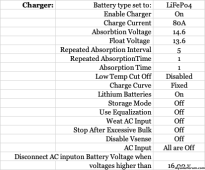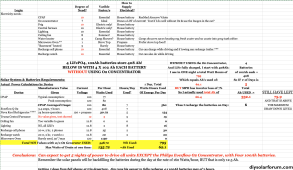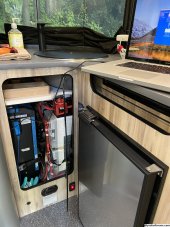CleanLivin
New Member
I am returning 4 of the Redodo 100Ah Mini SMART batteries because several three times in 6 weeks one or the other of the 4 batteries shuts down. To find which battery is "locked out" and then resting it is not fun due to the fact the four Redodo 100Ah Mini just fit BUT my installation is 2 batteries stacked in back corner of compartment and two stacked in front.
I only have 11" X 18" floor space, 18.5" high to place 4 LiFePO4 batteries.
To reset per Redodo:
"Hello John,
Thanks for the detail information!
It is the normal phenomenon for Smart batteries. The batteries have been protected for fully charged.
Please connect the battery with a load (current>2A) for just 2 mins, then disconnect the connections, wait 30 mins, the voltage of the batteries will recover to around 13.33V.
Best Regards,"
------------------
To even check which battery or batteries of the four has shut down requires removing the front stack of batteries by disconnecting all of the parallel cables, unstraping the 2 front batteries and removing them from the compartment, then using a voltmeter hoping to find what battery is locked out. I've done this 3 times now and it is not fun.
Their tech support has been fine to work with but now returning batteries and need to find 4 batteries that will reset on their own after a few seconds or even a few minutes.
Of course Victron and my distributor have reviewed my settings and said this is a problem apparently specific to the batteries I have. (I've noticed Redodo is no longer offering the 100Ah Mini Smart on Amazon or their own website.)
I see SOK has:
Seems expensive but "Will" seems to like it. But I would like to find a couple of competitive companies to review.
I will call SOK tomorrow and see if this unit BMS will reset automatically.
Suggestions welcome.
I only have 11" X 18" floor space, 18.5" high to place 4 LiFePO4 batteries.
To reset per Redodo:
"Hello John,
Thanks for the detail information!
It is the normal phenomenon for Smart batteries. The batteries have been protected for fully charged.
Please connect the battery with a load (current>2A) for just 2 mins, then disconnect the connections, wait 30 mins, the voltage of the batteries will recover to around 13.33V.
Best Regards,"
------------------
To even check which battery or batteries of the four has shut down requires removing the front stack of batteries by disconnecting all of the parallel cables, unstraping the 2 front batteries and removing them from the compartment, then using a voltmeter hoping to find what battery is locked out. I've done this 3 times now and it is not fun.
Their tech support has been fine to work with but now returning batteries and need to find 4 batteries that will reset on their own after a few seconds or even a few minutes.
Of course Victron and my distributor have reviewed my settings and said this is a problem apparently specific to the batteries I have. (I've noticed Redodo is no longer offering the 100Ah Mini Smart on Amazon or their own website.)
I see SOK has:
12V 206Ah LiFePO4 Lithium Iron Phosphate Battery Pack
SKU: SK12V206Seems expensive but "Will" seems to like it. But I would like to find a couple of competitive companies to review.
I will call SOK tomorrow and see if this unit BMS will reset automatically.
Suggestions welcome.







